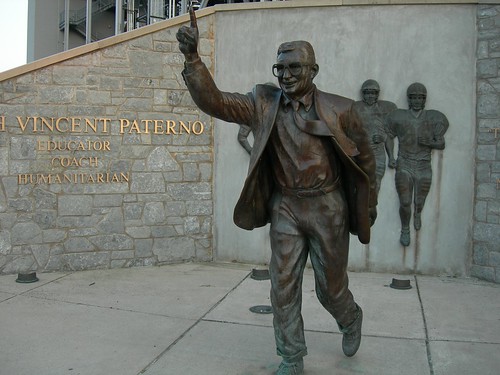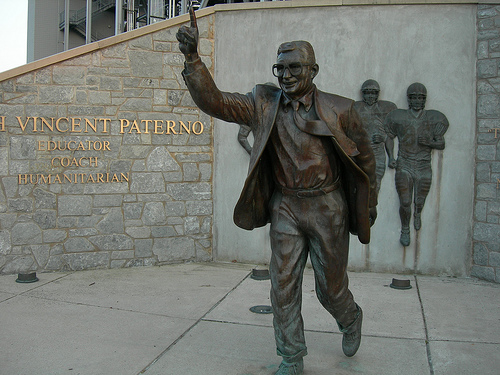
A case study on Onward State, the “official blog of Penn State University
For anyone who has made a mistake on social media—like posting to the wrong account or re-tweeting news that later turned out to be false—you’re usually forgiven by your friends and random followers. But when you’re representing a brand or community, it’s a different story.
Background
The Onward State project began in 2008 entirely by students (and is still run only by students), and nearly three years to the day, they found themselves on the front lines of one of the biggest sports stories of my generation: The Jerry Sandusky Scandal. Personally, I remember when the news first broke and how I felt about Joe Paterno. I had a weak connection to the university, my friend and co-worker Steve was a graduate and my friend Ryan Beckler was a reporter for Onward State.
Prior to the scandal, Onward State found themselves at the forefront of media, battling with the traditional news media in their counterpart, The Daily Collegian, as reported by Mashable in March 2010.
But for Onward State, the de-facto “official blog of all things Penn State, one tweet changed the course of their history and the history of their young student editors.
I stayed connected with the scandal and each piece of breaking news through Beckler, now University New Editor, who graciously gave me some insight into the fateful day of State’s history.
The Moment it Changed
It was January 21, 2012, and the team at Onward State had been getting more and more reports of Paterno on his deathbed. According to the post, “What Happened Last Night, the now former managing editor, Devon Edwards, “worked with reporters who were spread across campus at various points of interest. Late in the evening, the team got what they believed at the time were two independent and dependable confirmations that the beloved Paterno had indeed passed away.
The team debated and decided to send a tweet announcing the news. It did not take long for the team to realize their terrible mistake. Later that evening after the team had sent out a complete retraction and apology, Edwards wrote to State creator, Davis Shaver saying, “Sadness turned to shock and panic as I realized that I had made the mistake of a lifetime.
Beckler summarizes what the team felt the next morning, “I don’t know if there’s a single word that could describe the atmosphere of the following morning. It was such an empty feeling, and I didn’t even have a part in the decision. I can’t imagine how Devon must’ve felt. […] We didn’t and still don’t want anyone’s forgiveness. We made a huge, unforgivable mistake that doesn’t deserve anyone’s sympathy.
Upon making the retraction, Edwards immediately resigned as managing editor and the work began to repair the three-year-old organization.
So, how does a young, student-run, entrepreneurial news organization repair their image in the midst of their colossal mistake and all the while a major scandal story still needs to be covered? They kept pressing forward. They didn’t quit. And as Beckler said, “Keep doing what we’ve always done. Be Penn State’s independent news blog. Deliver the news, produce thought-provoking editorials, and foster a conversation around the Penn State community.
Based on what Edwards and Shaver have written and what Beckler said in his interview, here are three tips for repairing reputation and brand equity:
- Take full responsibility, now. Nothing erodes trust more than a lie … especially a lie told over and over only to be told later, “Oh, that was a lie, but you can still trust us. The great thing about Onward State’s mistake–while nearly unforgivable—was that they owned up to it right away (see apology and Edwards’ resignation). If you make a mistake, admit it right away. Don’t waste time. We live in the now.
- Explain how it will never happen again. The morning after the errant tweet, Shaver published the post explaining what had happened the night before and detailed that Edwards had stepped down effective immediately, as well as detailing how their editorial process had failed and what changes they were making. That builds trust.
- Be who you are. Mistakes can and do happen. We all know that. The key to re-building that trust (aside from the first two), is going back to what your organization is good at doing. Onward State is a blog about all things Penn State. Beckler agreed, saying that any re-building plan must include the following motto: “Dig in and stay true to your roots. It’s really the only option you have.
If Onward State has taught us anything, it is that social media really is powerful and mistakes can and do happen, but you can survive. But, in the end, it is best not to make them.
References:
http://onwardstate.com/topics/sandusky-scandal/
http://onwardstate.com/2012/01/22/what-happened-last-night/
http://onwardstate.com/2012/01/21/a-letter-from-the-managing-editor-of-onward-state/
Photo cred: jimmywayne
Richard Dedor is a writer, speaker, coach and social media consultant. He ran for office at age 18 and has written one book, Anything is Possible. You can find him at his blog, Believe in Possible and on Twitter @RichardDedor.


0 Comments